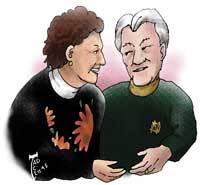Arms Outstretched
At a recent liturgy, a couple who had been married for 50 years came forward and renewed their marital promises to one another. Similarly, at the yearly gathering of our congregation, we sisters publicly renew our vows before returning to our mission. The commitment to love is not something professed only once but again and again. Recalling one’s first fervor of infatuation with the beloved fans into flame again the ability to continue loving despite hardships and challenges.
So it is with Peter in today’s Gospel. When pressed by a servant girl in the courtyard of the high priest, he had failed to acknowledge that he even knew Jesus, much less that he loved and believed in him. Earlier, at the tumultuous moment of Jesus’ arrest, he had hotheadedly lashed out with a sword and had cut off the ear of a slave of the high priest. His failures to love are symbolically depicted in his inability to catch any fish.
Yet Peter still does love Jesus and is still able to bring many others into that circle of love. Allowing himself to be fed by the source of love, he experiences forgiveness, renewal and empowerment to extend that love to others. It is an efficacious and uniting love, symbolized by the great haul of fish and the untorn net.
Three times Peter professes his love. Three is a complete number, signaling fullness. Some commentators note that there are two different Greek words for love in this exchange between Jesus and Peter. The first two times Jesus uses the verb agapao, signaling the kind of Christian love that is totally self-giving and inclusive. Both times Peter responds with the verb phileo, which refers to the love of friends. The third time Jesus switches to phileo, to which Peter again responds with phileo.
Some commentators think this shift in vocabulary reflects Peter’s inability to achieve the highest form of love for which Jesus asks, and that Jesus comes down to Peter’s level the third time. More likely the Evangelist is simply varying the vocabulary, as is the case with the verbs for feed (boskein, vv. 15, 17) and tend (poi-mainein, v. 16), and the nouns for lambs (arnion, v. 15) and sheep (probaton, vv. 16, 17). Moreover, in this Gospel, there is no greater love than the love of a friend who lays down his or her life for a friend (15:13).
The love between Jesus and his own is both fruitful and costly. It is not a love that encloses the lovers in an exclusive bubble of bliss. It is a love that bears fruit, extending itself outward in mission, feeding the hungers of those who are most vulnerable. It asks disciples to stand with arms outstretched—extended in prayer, in embrace of the Beloved and all his friends, in service to those in need and, finally, in cruciformity—as the outstretched arms of Christ draw all to himself.
This article also appeared in print, under the headline “Arms Outstretched,” in the April 12, 2010, issue.








